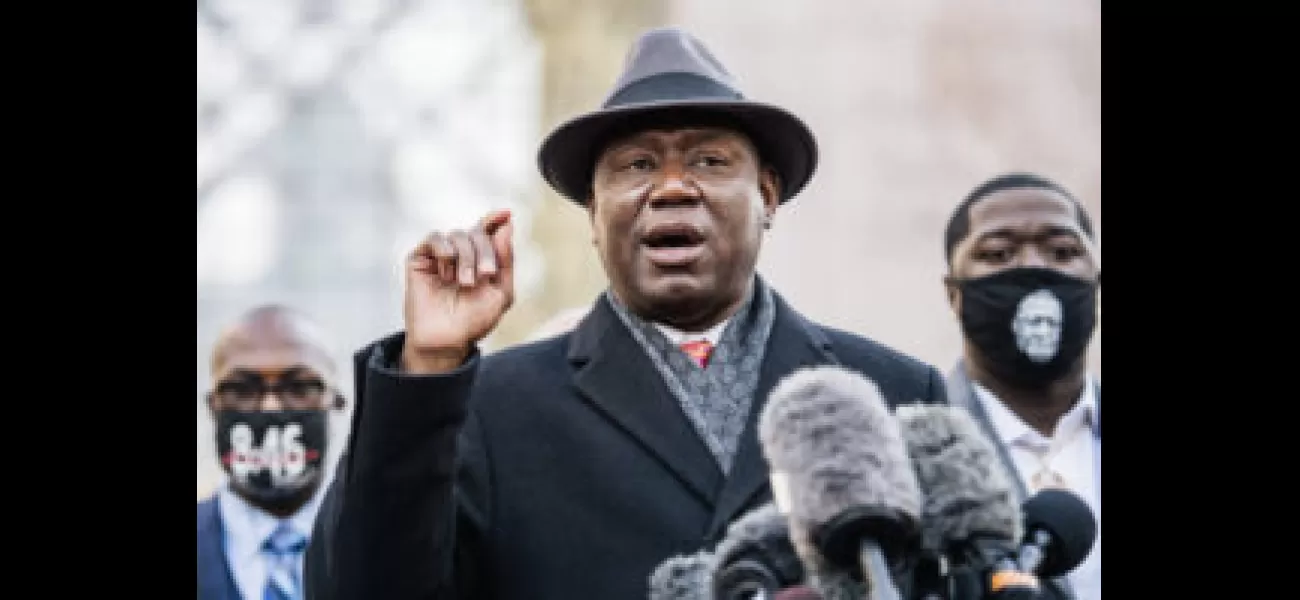Ben Crump has joined the effort to get charges of voter fraud dropped against a Black Florida woman.
Laws in Florida need to be looked into.
October 11th 2023.

Civil Rights lawyer Ben Crump is joining the defense team of Marsha Ervin, the Black woman charged with voter fraud in Tallahassee, FL, CNN reported. Ervin, 69, was arrested on Sept 29. in Tallahassee at 3 a.m. after being accused of voting while still on probation, in the 2020 general and 2022 primary elections, after being released from prison in 2018 for a felony conviction.
In 2022, Gov. Ron DeSantis signed a new law creating a police force solely to investigate election crimes and increase penalties for state election law violations. Ervin's legal team pointed out the confusion in the legislation that explained when residents with former felony convictions can actually vote. During a press conference on Oct. 10, Ben Crump described the tactic as “voter intimidation” and said the law will have a “chilling effect” on other voters.
“There is no other evidence that she had the intent to commit fraud,” Ervin’s attorney, Mutaqee Akbar said. “To a layman, completion of a sentence means when you are released from custody. She had no idea that she needed to complete her probation as well in order to vote.”
According to an arrest affidavit, the Tallahassee native finalized her voter registration application in September 2020 and received a voter information card in October 2020, along with a vote-by-mail ballot for the 2022 primary election. The investigator who interviewed her in October 2022 said Ervin mentioned that “she believed she was allowed to vote because she was told she could when she was released from prison,” and she “remembered it being reported that felons could now vote in Florida from the reports on television.”
Florida voters approved Amendment Four in November 2018, granting people with past felony convictions – except for murder and sex offense convictions – full voting rights after their sentence was complete, including probation and parole. When DeSantis took office, he signed a bill delaying the rights restoration until after the person had paid all fines and fees associated with the felony conviction.
A spokesperson for the Tallahassee Police Department, Alicia Hill, said Ervin’s arrest was the result of an officer “proactively searching for wanted people,” according to The Tallahassee Democrat.
In response to a USA Today story regarding the case, DeSantis’ press secretary, Alex Lanfranconi, mocked Ervin’s felony case on Twitter. “I’m sorry her sleep was disturbed. She served time for neglecting her own mother in horrific conditions. Then after prison she voted illegally,” Lanfranconi tweeted.
Florida House Minority Leader Fentrice Driskell is standing in solidarity with Ervin, saying DeSantis’ law intentionally confused Black people. “She is yet another Black person in Florida, another Floridian, that has been tricked by this confusing system they put in place,” Driskell said. “And I think it is confusing on purpose. I think it is intentional.”
Ben Crump is now part of the legal team defending Marsha Ervin, a 69-year-old Black woman who has been accused of voter fraud in Tallahassee, Florida. The confusion surrounding the new law, signed by Governor Ron DeSantis, which imposed stricter punishments for election violations, has been highlighted by Ervin's legal team.
At a press conference on October 10, Crump described the law as an act of “voter intimidation" which will have a “chilling effect” on other voters. Ervin's attorney, Mutaqee Akbar, went on to point out that there was no evidence of fraudulent intent. Furthermore, Akbar argued that Ervin was unaware of the need to complete her probation in order to vote because she believed she was allowed to do so upon her release from prison.
According to an arrest affidavit, Ervin finalized her voter registration application in September 2020 and received a voter information card in October 2020, along with a vote-by-mail ballot for the 2022 primary election. Despite the fact that Amendment Four, passed in 2018, granted people with past felony convictions the right to vote after their sentence was complete, DeSantis' bill delayed the rights restoration until after all fines and fees associated with the felony conviction were paid.
In response to a USA Today story about Ervin's case, DeSantis' press secretary, Alex Lanfranconi, made light of the situation, tweeting, “I’m sorry her sleep was disturbed. She served time for neglecting her own mother in horrific conditions. Then after prison she voted illegally.”
Florida House Minority Leader Fentrice Driskell believes that the confusion caused by DeSantis' law is intentional, claiming that Ervin is just one of many Black people in Florida who have been tricked by the system.
It remains to be seen what the outcome of Ervin's case will be, but with Ben Crump now part of the defense team, it is likely that her legal team will fight tooth and nail for justice.
In 2022, Gov. Ron DeSantis signed a new law creating a police force solely to investigate election crimes and increase penalties for state election law violations. Ervin's legal team pointed out the confusion in the legislation that explained when residents with former felony convictions can actually vote. During a press conference on Oct. 10, Ben Crump described the tactic as “voter intimidation” and said the law will have a “chilling effect” on other voters.
“There is no other evidence that she had the intent to commit fraud,” Ervin’s attorney, Mutaqee Akbar said. “To a layman, completion of a sentence means when you are released from custody. She had no idea that she needed to complete her probation as well in order to vote.”
According to an arrest affidavit, the Tallahassee native finalized her voter registration application in September 2020 and received a voter information card in October 2020, along with a vote-by-mail ballot for the 2022 primary election. The investigator who interviewed her in October 2022 said Ervin mentioned that “she believed she was allowed to vote because she was told she could when she was released from prison,” and she “remembered it being reported that felons could now vote in Florida from the reports on television.”
Florida voters approved Amendment Four in November 2018, granting people with past felony convictions – except for murder and sex offense convictions – full voting rights after their sentence was complete, including probation and parole. When DeSantis took office, he signed a bill delaying the rights restoration until after the person had paid all fines and fees associated with the felony conviction.
A spokesperson for the Tallahassee Police Department, Alicia Hill, said Ervin’s arrest was the result of an officer “proactively searching for wanted people,” according to The Tallahassee Democrat.
In response to a USA Today story regarding the case, DeSantis’ press secretary, Alex Lanfranconi, mocked Ervin’s felony case on Twitter. “I’m sorry her sleep was disturbed. She served time for neglecting her own mother in horrific conditions. Then after prison she voted illegally,” Lanfranconi tweeted.
Florida House Minority Leader Fentrice Driskell is standing in solidarity with Ervin, saying DeSantis’ law intentionally confused Black people. “She is yet another Black person in Florida, another Floridian, that has been tricked by this confusing system they put in place,” Driskell said. “And I think it is confusing on purpose. I think it is intentional.”
Ben Crump is now part of the legal team defending Marsha Ervin, a 69-year-old Black woman who has been accused of voter fraud in Tallahassee, Florida. The confusion surrounding the new law, signed by Governor Ron DeSantis, which imposed stricter punishments for election violations, has been highlighted by Ervin's legal team.
At a press conference on October 10, Crump described the law as an act of “voter intimidation" which will have a “chilling effect” on other voters. Ervin's attorney, Mutaqee Akbar, went on to point out that there was no evidence of fraudulent intent. Furthermore, Akbar argued that Ervin was unaware of the need to complete her probation in order to vote because she believed she was allowed to do so upon her release from prison.
According to an arrest affidavit, Ervin finalized her voter registration application in September 2020 and received a voter information card in October 2020, along with a vote-by-mail ballot for the 2022 primary election. Despite the fact that Amendment Four, passed in 2018, granted people with past felony convictions the right to vote after their sentence was complete, DeSantis' bill delayed the rights restoration until after all fines and fees associated with the felony conviction were paid.
In response to a USA Today story about Ervin's case, DeSantis' press secretary, Alex Lanfranconi, made light of the situation, tweeting, “I’m sorry her sleep was disturbed. She served time for neglecting her own mother in horrific conditions. Then after prison she voted illegally.”
Florida House Minority Leader Fentrice Driskell believes that the confusion caused by DeSantis' law is intentional, claiming that Ervin is just one of many Black people in Florida who have been tricked by the system.
It remains to be seen what the outcome of Ervin's case will be, but with Ben Crump now part of the defense team, it is likely that her legal team will fight tooth and nail for justice.
[This article has been trending online recently and has been generated with AI. Your feed is customized.]
[Generative AI is experimental.]
0
0
Submit Comment





